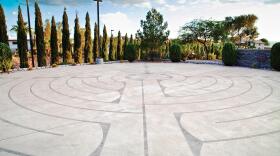There is nothing about the lobby of Well Rounded Momma that says medical care. Instead, the first impression you get is that of a kitschy, high-end boutique, complete with vintage furniture and neatly arranged colorful products.
A second, closer look reveals that the products on sale are stones, oils, and supplements for pregnant and postnatal women and newborns. It is, perhaps, what many would expect from a midwife-based birth-support and maternity-care center, which is often associated with a new age, hippie vibe — but Well Rounded Momma is a practice very much grounded in scientific roots.
That’s important to founder Sherry Hopkins. Hopkins emphasizes that as midwives, she and her partners practice evidence-based care. For her, that means allowing clients to choose from a range of safe options in their birth plan. Those options include being allowed to move around and try different positions during labor or utilize water to manage pain, options that Hopkins says are not offered in local hospitals. Indeed, it was that lack of options that motivated her to open Well Rounded Momma shortly after she moved here from Utah in 2006.
“I was shocked at maternity care options in the valley, and so I opened Well Rounded Momma as kind of a hobby, just a place where women could come take classes and hire a doula and have support in the hospital,” Hopkins says. “From seeing Vegas in the movies, you think of it as this forward, progressive town, and it’s not. We’re very behind in the field of medicine, and politically, and I was really surprised about that aspect.”
Hopkins’ team at Well Rounded Momma includes midwives, doulas, massage therapists, and others. In 2008, Hopkins herself became a certified midwife with the North American Registry of Midwives.
Certified Professional Midwives, or CPMs, have far fewer clients than the typical obstetrician — where a doctor might have 30-60 deliveries a month, a midwife will likely only have three or four. Doctors can usually see patients for limited amounts of time, so they rely on nurses to assist with care. Midwives can sit with clients for much longer periods, allowing them to better understand the mother’s needs and desires.
According to data from the World Health Organization, the United States’ maternal mortality rates rose from 0.6 percent in 2000 to 0.8 percent in 2015 — making it the only developed nation to see an increase. “If you look at countries where they utilize midwifery care, and care is more personal, it’s more one-on-one, you spend more time with your clients, outcomes are better,” Hopkins says. “Continuity of care is a huge part of what makes labor safe.”
In Nevada, care is complicated by a low doctor-to-patient ratio. According to data from Pew Charitable Trusts, there were fewer than 600 obstetrician-gynecologists in the state in 2016 — that’s 8-11 doctors per 100,000 people. There were fewer than 55 certified midwives in the state that same year, around three per 100,000. Hopkins’ goal is to saturate the market with midwives. Three more will receive certification and begin working with the group this year, including Hopkins’ daughter, Cora.
Midwives can assist with both hospital and home births. Following home births, midwives return to check on mother and baby and perform newborn screenings. They are able to perform all the screenings babies get in the hospital; the two things they can’t do are circumcisions and vaccinations.
For women who prefer a traditional hospital experience, Well Rounded Momma offers workshops and classes on breastfeeding, babywearing, and childbirth, among others.
“I think if a woman wants to truly own her experience and her outcomes, then she has to take some steps, and it doesn’t have to be something that we provide. If she just came in and asked, ‘What books could I read, what videos could I watch,’ there’s just got to be some kind of education and informative resource,” Hopkins says. “Ninety-year-old women remember their birth story. It’s something you never forget … it’s one of those moments that (you) step into parenthood thinking, ‘Could I own this or not?’”
8826 S. Eastern Ave. #111;
wellroundedmomma.com
Correction 08/02/2017: This article was corrected to reflect the difference between certified professional midwives and certified nurse-midwives, as well as their certifications and scope of practice.






